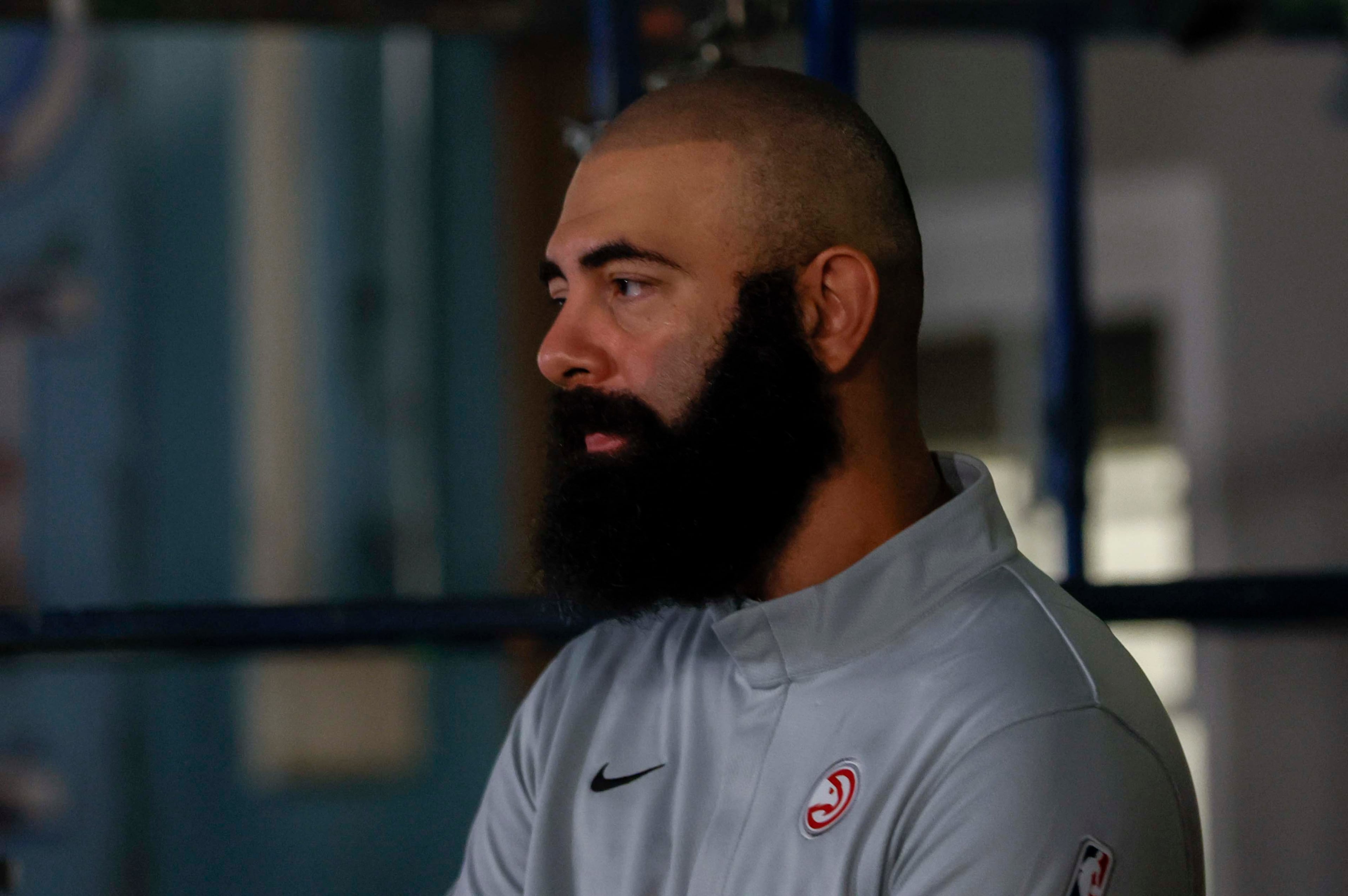John Collins thinks playmaking is the next step in evolving his game

When “John Collins” and “lobs” are in the same sentence, it’s usually some variation of the standout rim-runner Collins catching lobs from Trae Young and finishing around the rim.
But, this time it’s a little different: now that true center Clint Capela is a Hawk, Collins, sliding back to his natural position at power forward, can’t wait to connect with Capela on a lob.
“For me, having another dude that’s in the same level of athlete that I am, it’s going to be amazing to sort of know how to throw him open and know how he wants to catch the ball,” Collins said.
“I’ve been working on throwing lobs and trying to get him open above the rim because I know that’s what I like to do, that’s what he likes to do, so we can speak the same language.”
That ties in to what Collins sees as the next phase of his game — playmaking. In his third season with the Hawks, Collins, who takes pride in his versatility, led the team in 3-point percentage (40.1%) and was one of three players averaging 20-plus points and 10-plus rebounds (21.6 points, 10.1 rebounds) at the time of the season’s suspension March 11, albeit in a smaller sample size of 41 games because of his 25-game suspension and the Hawks being one of eight teams excluded from the NBA’s restart in Orlando.
He took a step forward on defense, too, despite often playing out of position at center and matching up with bigger players (he’s 6-foot-8.5 without shoes). But, getting better at setting up teammates is one of his big priorities going into Year 4 (Collins averaged 1.5 assists per game).
“Going forward, I feel like playmaking, for me, is going to be the next biggest thing,” Collins said. “Obviously, I can always get better on defense, improve intensity, my willingness to be locked in and stay in a stance, all that stuff is great, but I feel like playmaking, for myself, not only to create shots for myself but to create shots for others, benefits everybody.”
As starting point guard (and All-Star starter, second in the NBA in assists with 9.3 per game), Young obviously is the Hawks’ go-to playmaker, but there are several forwards and big men around the league who excel as passers, too, including Denver’s Nikola Jokic (6.9 assists per game), and the Lakers’ LeBron James (10.6 per game).
The Hawks won’t play another NBA game for a while, with Dec. 1 as the tentative start date for the 2020-21 season, so Collins certainly will have some time to work on developing his playmaking, which starts with film study and trying to improve as a ballhandler.
“Ballhandling would be one, just trying to tighten it up and get it crisp,” Collins said. “Watching film and seeing how my teammates like to catch the ball, seeing what their tendencies are helps. There’s so many things, a multitude of things. I feel like getting lower and like I said, figuring out how I like to pass, figuring out what my strengths are, do I like overhand, underhand, and timing, there’s a bunch of factors that go into it. Film is probably the first place where I’ll start, and then we can go from there.”
Collins has seen an increase in production and role in each of his NBA seasons and could become the longest-tenured current Hawks player this offseason, at the age of 22, depending on what happens when DeAndre’ Bembry hits free agency.
Alongside Young (whom he predates by one season on the roster), Collins has been a central part of the Hawks' rebuilding efforts. Collins is up for a rookie extension, and hopes to get a deal done this offseason, though the Hawks could also choose to wait until Collins hits free agency after next season.
Collins has said many times he feels he should be in the conversation for a max deal, though he understands the nature of negotiations and not always getting exactly what you pictured. He has also been adamant that he would prefer to get a deal done this offseason as opposed to entering a “contract year.”
“I just feel like the work I put in speaks for itself. … It’s just something that hopefully we can come to an agreement on this summer,”Collins said. “I definitely feel like I’ve put in a lot of work and shown my value and shown the worth, shown my competitive spirit, my willingness to be within the organization, my leadership skills. Hopefully all that pays off in the end and we can come to an agreement. I want to be a Hawk and hopefully I want to sign that deal here.”
Regardless of whether a deal is reached this offseason or that’s pushed to the back burner, Collins will have another year in Atlanta, and the Hawks “Core Five” players all will return with another year of experience under their belt in Collins, 22-year-old De’Andre Hunter, 21-year-olds Young and Huerter and 20-year-old Cam Reddish. They’ll be joined by 26-year-old Capela, who figures to give the team a defensive and rebounding boost, as well as the products of the Hawks’ draft pick and free-agency signings.
There have been questions of how Collins and Capela will ultimately mesh (which hasn’t been put to the test yet, since Capela was injured when the Hawks were still playing), and questions about if Collins can be the defender the Hawks need him to be moving forward.
But, if you ask Collins, having him back in his natural position and Capela (who is 6-10) might help clear up a lot of that.
“Size is just something you can’t teach, you know what I mean?” Collins said. “I can’t be bigger than Joel Embiid or Steven Adams or Aron Baynes. It’s almost near impossible. I do my best to guard the guys when I can or when the time comes for us to play small-ball, situational stuff. But definitely having Clint there to be a true 5 puts me back in my position and allows things to run smoother and allows us to be in our true and natural (positions), so hopefully it works and flows like I’m envisioning in my mind.”
Overall, Collins looks forward to playing with Capela, since that will free him up to do other things and give the team as a whole more size on defense. Philadelphia center Embiid is a popular example Collins pointed to, as the Hawks struggled to contain Embiid this past season.
“For guys who don’t watch specifically and understand how I play out of position, you look at stats, and say I play Joel that night and I’m in foul trouble,” Collins said. “A lot of the times, it’s because I’m out of position and I’m trying to make up for him being so big. Just small things are going to hopefully lead to a bigger surplus in the end. Obviously, you might not see it every single game, every single detail, but those small things and those small details add up so much, and that’s what creates winning.”



